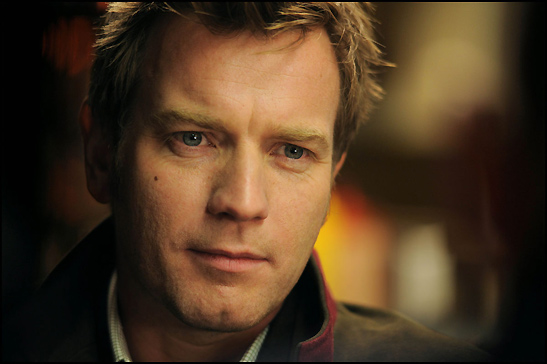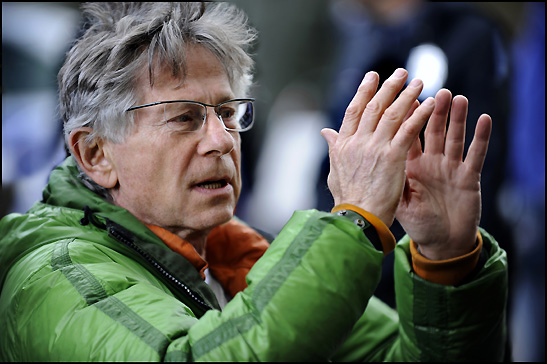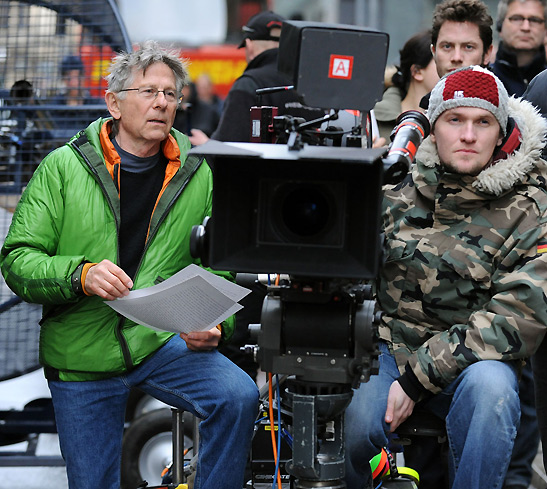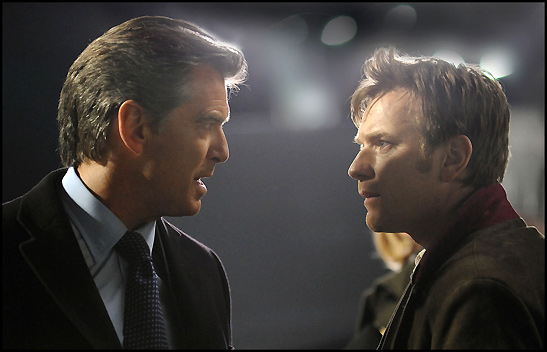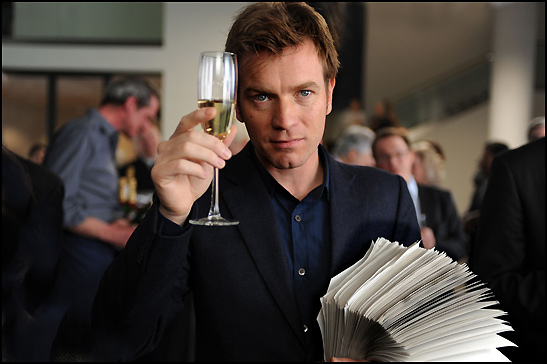 |
 |
|
 |

|
EDITORíS NOTE: The following interview originally
appeared in the March 11, 2010 edition of the Santa Monica Mirror and
the edited version is being reprinted as a courtesy of that publication.
Ewan McGregor
Q: Martha’s Vineyard was so authentic, that it’s surprising to learn that the film was actually shot on an island off the coast of Germany. Did you visit Martha’s Vineyard to get a feel of the location? McGregor: I’ve never been there. I would like to go very much. I hear it’s very nice. But I think they spent a lot of time finding the right place to shoot the film that would represent it well and have the right feeling. More than looking exactly like Martha’s Vineyard, I’m sure Polanski was looking for a setting or a place where the characters are isolated and claustrophobic-sized, if that’s a word. It’s quite a good word to say, but I don’t know if it’s really a word. Maybe that was more important than actually shooting on Martha’s Vineyard. But I believe we accomplished that.
Q: Were you familiar with Polanksi’s films before this project? McGregor: The films of his that I knew very well were Chinatown, Macbeth, Rosemary’s Baby, Papillon, and The Fearless Vampire Killers. Of course, once I knew I would be working with Roman, I went off and watched most of his films, including The Tenant, Cul-de-sac, Knife in the Water, and Repulsion. Sitting down and watching these films was a nice job to have. Q: How did his directing style differ from other directors with whom you worked? McGregor: He’s very brusque when you’re on set, and very direct. I think it’s fair to say he doesn’t sugar coat his direction in any way. So you’re left with no doubt with what he wants. Occasionally, he’ll act out for you or take the script out of your hands and read it to you. For actors, we never like to be given line readings. It’s just not a good way to be directing and we certainly don’t like to have a scene acted out for us because then you’re copying someone else as opposed to finding it and making it your own. However, he’s Polanski and you can’t take that out of the equation. He’s an iconic, legendary director and his direction is extraordinary.
Q: You’re an incredibly gifted actor so how did you handle his style of directing? McGregor: We’re sensitive souls as actors and we don’t like to feel like what we tried is wrong, but you soon realize this is just the way he is and is like that with everybody. I was on all the time and had the luxury of watching him from the first day of shooting to the last and saw how he directed the crew and technicians. He’s the same with everybody; there’s nothing personal. He sees it in his head and wants it to be the way he wrote it. If it’s not the way he sees it in his head, then it’s not right. So, he works everyone until he gets what he wants. Q: How much of him do you think is in the story? McGregor: I think there’s no question that all filmmakers are depicting something of themselves in their characters. It’s their art and their comments and the entire film is filtered through their heads. That said, we never felt that Polanski was making a comment about his own life. There’s a scene where the British Prime Minister becomes aware that he is now going to have to stand trial and defend himself in The Hague for war crimes and his lawyer tells him that as long as he stays in America, he’s safe because America doesn’t recognize the International Criminal Court. His attorney rattles off some other countries where he would be safe and it’s a very small list. Of course we know Polanski has lived in that situation since the 70s where he’s been able to travel only to a few specific countries where he won’t face extradition to the States. Q: Do you think the novel written by Robert Harris had Polanski in mind? McGregor: It seems like it was written as a comment about Polanski’s life. However, Harris wrote the book long before anyone dreamt that Polanski might direct this film. Because we know about Polanski’s life, it seems like a loud comment, but on set, he never personalized anything to us. He never said, ‘this is a bit like my life.’
Q: The British Prime Minister, as played by Pierce Brosnan, bears a striking resemblance to Tony Blair. What are you thoughts on that? McGregor: I think there’s no question that it’s resoundingly like Tony Blair. However, Pierce asked Polanski how much like Blair he should be and Polanski told him that he shouldn’t think that he was playing Blair and should not try to mimic him. However, all the facts point to that character being Blair. Q: How about recent parallels in the UK? McGregor: In terms of British politics, some of the themes in the film have been reflected in the real world. In our movie, the former Prime Minister is accused of war crimes and in real life, Tony Blair had to sit in front of a panel a few weeks ago and try to explain his decision making about taking Britain into the Iraq war. There’s lots of talk in the news about Britain’s involvement in rendition flights and questions about did they or did they not touch down on British soil, and were British forces involved in torturing or interrogating prisoners on behalf of the American government, all of which would be considered an illegal act. So there are many things in the film that seem to be reflective of real life events. Q: What do you think will be the outcome of Blair’s testimony? McGregor: I don’t know what will happen as a result of his testimony. I don’t know if will make any difference and certainly not to the families who’ve lost kids over there and certainly not to all the people lost in that war, but maybe it’s right that he still has to answer hard questions. Here in America, it seems that former President Bush is never going to have to be accountable for his decisions and will probably never have to appear before a panel. Q: Ghostwriters are unsung heroes as they don’t get any credit for their work. Did you research the psychology of this breed of writers and was it reflected in your character? McGregor: In a conversation I had with the author of the book, Robert Harris, he talked about the ghostwriter as having an inherent sense of failure as his name is not attached to his words. I think it rings true in the way I played “the ghost.” He’s kind of given up a little bit. I didn’t think I had to do any research because it was quite clear in both the novel and the script. Also, I published a couple of travel books that were written from diaries so I had worked with two ghost writers, both entirely different from each other, and that gave me insight into the interview process.
Q: Looking back on your career, was there a pivotal moment in your training? McGregor: Acting is very instinctive and you’re always learning but it would be very difficult for me to put my finger on a certain thing. My path is something I’m very glad of. I left school when I was just 16 and started working in the theatre. For six months I was part of the stage crew and was in the world I always wanted to be in since I was a kid, when I first saw Star Wars with my uncle. After that I did a one-year theatre arts course in Scotland followed by a three-year acting course in London’s Guildhall School of Music and Drama. That, for me, was a perfect way to enter the business and all of that learning is part of my acting. Q: Was there one scene that was particularly difficult in this film? McGregor: No, I don’t think so. I don’t ever find acting difficult. I try to make it as uncomplicated and as natural as possible. I like very much for my characters to be real people. Because I was in all of the film, I was able to underplay my character. Sometimes in acting, it’s not the scene you imagine is going to stumble you or you find difficult on that day. It’s very often not the big emotional scenes because usually they take care of themselves. You come on set and the atmosphere is set for you. Q: What is the message of the film? McGregor: Ultimately the film is showing a situation where our politicians, even those who hold the highest seats in government, have to be accountable for their actions and their decisions. I think that’s a very strong message and one that’s as clear as day to me. Ewan McGregor is a screen icon in his own right,
beginning with his break-out role in Trainspotting, followed by a long
list of amazing performances in such films as Emma, Angels and Demons,
Cassandra’s Dream, and his most dazzling performance as the smitten
writer in Moulin Rouge. Perhaps the most fascinating aspect of his career
is when he came full circle to play Obi-Wan Kenobi in Star Wars, the
film that launched his dream of becoming an actor when he was six years
old. |
|
Thanks so much for those lovely tourism photos, especially of Ireland. I certainly enjoyed all the places you suggested, and am working towards my next vacation. Don’t forget Cuba. That’s an exciting place. Rosalie, Los Angeles
Enjoyed your article on Mira Sorvino. Such an interesting background – family, education, career and now human rights activist. I'm not a gossip mag fan so getting more meaty news about movie celebrities from you gives me hope that there are some inteligent life forms in Hollywood. Peter Paul, Pasadena, CA
Thank you, Bev. This reminded me to go see the movie, "An Education," which I had already almost forgotten about, having seen the preview a few weeks ago. I enjoy this actress quite a bit--she has a uniqueness about her and she pulls me in. I enjoyed this. Sandeee, Seattle, WA
Thank you Beverly,I really enjoyed reading about your intimate conversation with Forest, of whom I am a great admirer. I look forward to seeing the film "Our Family Wedding." Yoka, Westlake Village, CA
Thank you for the sending me the beautiful article you wrote about Ireland. We will use your recomendations for hotels in the Southern part. We plan to also go to Dublin and some other Northern cities so I will get some recommendations for these from others. After reading your article, I am getting more excited about going. I think we will be in Ireland for 8 days altogether. Leah Mendelsohn, Santa Monica, CA
Very much enjoyed Ms. Cohn's article about Munich, especially the visuals. Though it has been 25 years since my last visit, the piece brought back countless pleasant memories of the city and the people!! Many thanks. Lawrence, Los Angeles * * * Marianplatz and that general area is truly one of the best Christmas celebrations in the world. Between that and Oktoberfest (which I can only imagine) Munich is one of the greatest cities in the world for major annual events. Christopher Dale, New York, NY
Hi Bev, you have done some wonderful pieces on some great celebs...Great work. The travel articles are just wonderful too. Scott Mueller, Huntington Beach, CA
Your great Zurich article makes me want to go there for the holidays! I love the photos, too, especially the ones of you in the sleigh, the view over the houses and the zoo! Anna Marie, Santa Monica, CA * * * Lovely article! As a European, and having been to Zurich (albeit in summer) I can vouch for this lovely city. Great pictures, too! Helene Robins, Santa Monica, CA
Hi Bev, Nice review, nice seeing you, nice website interface "...Talk to Bev" - Enjoy your Thanksgiving! Richard D. Kaye, Marina del Rey, CA
Hi Bev, Your interview with John Cusack is very interesting. I always wondered why these actors/actresses always get top billing when really, if you think about it, the real work come from the animators, writers and tech whizzes who spend far more hours on the movie than those actors. I know, I know, it's the all about marketing. The names of these actors are what bring in the big bucks. Still, I think these actors are way overpaid for the "little" that they do. I remember that once upon a time, the early animation classics never mentioned the voices behind the characters. I think it was only later when Walt Disney tapped into the voices of known celebrities like Walter Matthau in the Jungle Book or Zsa Zsa Gabor in The Rescuers that the voices became a marketing magnet. Keep up the good work. I enjoy your interviews as you peer into the lives of the Hollywood celebrities. Peter Paul of South Pasadena, CA
|
This site is designed and maintained by WYNK Marketing. Send all technical issues to: support@wynkmarketing.com

|











